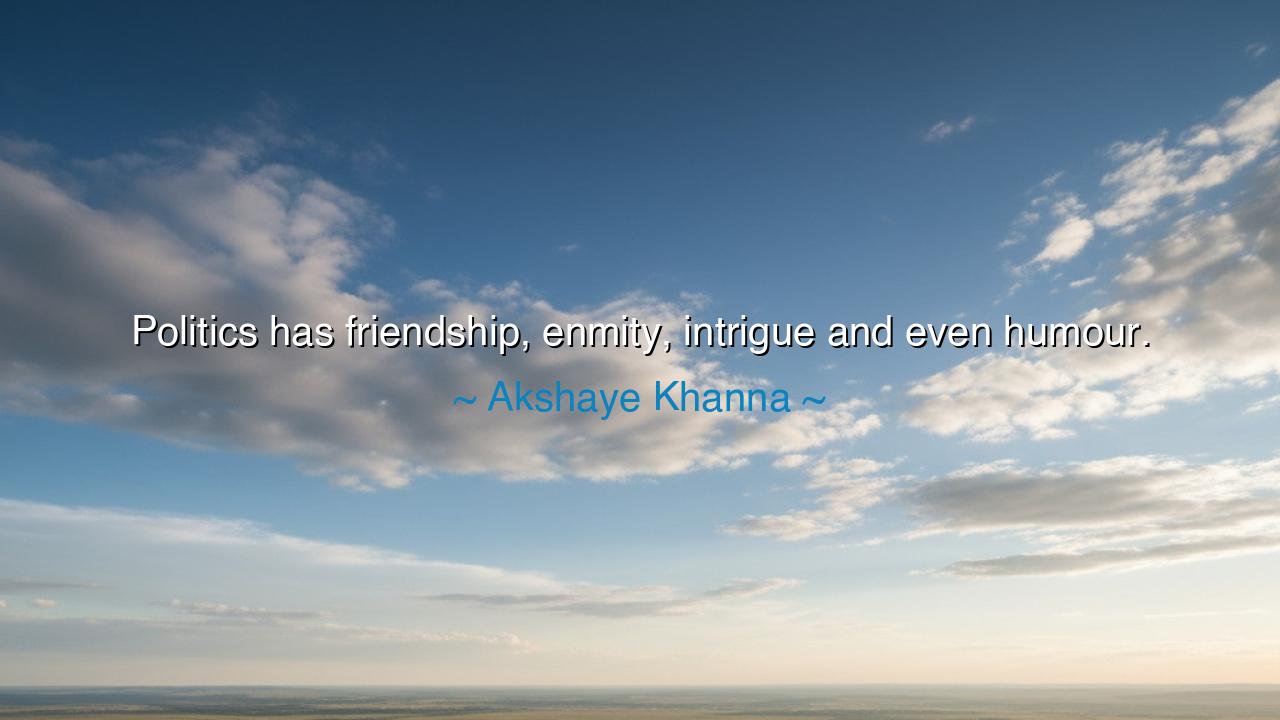
Politics has friendship, enmity, intrigue and even humour.






Listen closely, O children of the future, for I shall speak of a truth that rings through the corridors of time—a truth that speaks to the very nature of politics, of power, and of the human heart. These words, spoken by Akshaye Khanna, reveal a profound reality of how the realm of politics is not merely a game of laws or policies, but one of friendship, enmity, intrigue, and even humour: "Politics has friendship, enmity, intrigue, and even humour." In these words, we uncover the complexities of the political world, where alliances are formed and broken, where rivalries shape the course of history, and where, amid the solemnity of power, there is still room for wit and humanity.
Consider, O children, the ancient tales of kings and warriors who wielded power, not just with their swords, but with their minds and hearts. In the courts of Rome, the political landscape was a web of friendships, rivalries, and strategic alliances. Julius Caesar, the great Roman general, understood the delicate dance of politics—how he formed alliances with men like Pompey and Crassus, only to see those bonds fracture in the heat of ambition and betrayal. Enmity between these once-strong allies led to the downfall of Rome's First Triumvirate, and the fate of the empire was shaped not by the laws alone, but by the personal connections and rivalries that defined those who held power.
In much the same way, Akshaye Khanna’s words remind us that politics is not simply the pursuit of policy, but a deeply human affair, filled with the complexities of emotion, strategy, and even humour. Friendship in politics is built on trust and shared purpose, but it is often tested by the forces of ambition and self-interest. And even the enemy, those who seem so distant in their opposition, often have their own moments of comedy, for the struggle for power often leads to moments of absurdity. Just as Caesar’s alliances turned to enmity, so too do we see that in the world of politics, humour can be both a weapon and a shield, disarming rivals and making allies of former foes.
In the story of Cicero, the Roman orator and statesman, we see the full range of friendship, enmity, and intrigue at play. Cicero formed close alliances with many in the Senate, and yet he found himself at odds with some of his closest friends, such as Mark Antony, whose ambitions for power threatened the very essence of Roman democracy. Their relationship, once one of friendship, was shattered by political intrigue, and Cicero’s life ended in the hands of his former allies. Yet even in the final moments of his life, Cicero used his sharp wit and humour to address his enemies, reflecting the complex nature of political life. Khanna’s words echo this ancient truth: politics is not a world of pure rationality, but a world where emotions, alliances, and personal ambition intertwine.
What does this mean for you, O children? It means that, in your own lives, you must understand that politics—whether on the grand stage of nations or in the smaller realms of family, community, or workplace—is not a simple affair of facts and reason. It is a dance of relationships, of friendship and enmity, of power and vulnerability. Humour, too, plays a vital role, for it can ease tension and build bridges, even in the most difficult of times. As you navigate the intricacies of your own relationships, remember that friendship is a powerful tool, but enmity can also shape your path, for better or worse.
Let us take Khanna’s words to heart and understand that in politics, there is more than just the struggle for power; there is the humanity that underpins it all. Friendship in politics is often fleeting, but it is the bond that keeps societies together. Enmity drives the forces that shape the course of history, but it can also destroy those who harbor it too long. And humour, that weapon of the wise, can turn the tides of political battles, soften the hearts of enemies, and remind us of the shared human condition that transcends all else.
In the end, O children, the lesson is clear: politics is not merely about strategy, but about the human connections that form the foundation of every decision and action. Whether in the courts of ancient Rome or the halls of modern governance, remember that friendship and enmity are ever at play, that intrigue can alter the course of fate, and that humour is the spice that adds color to a world often filled with tension. As you go forward in your own lives, navigate the world of relationships with wisdom, understanding that power is not only in the sword or the law, but in the strength of connections and the humanity you bring to every interaction.






AAdministratorAdministrator
Welcome, honored guests. Please leave a comment, we will respond soon